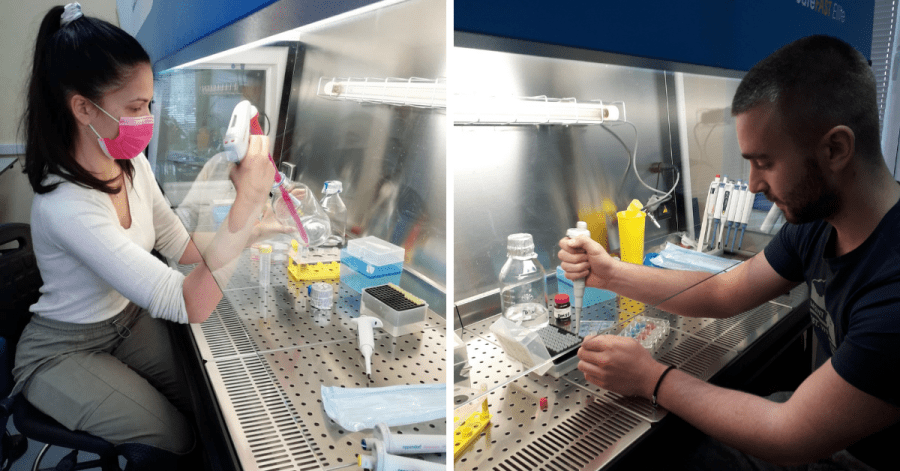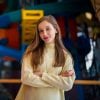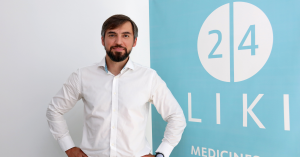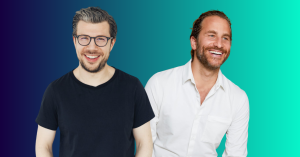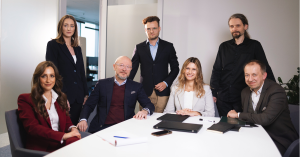Еvery year between 40 and 50 percent of people above the age of 50 undergo a full knee replacement procedure. Surprisingly, over the decade, this percentage has increased to reach a percentage between 55 and 60. At the same time, around 85 to 90 percent of all total knee replacement operations performed are successful for approximately 10 to 15 years, depending on the patient’s level of activity. After that time revision surgery may be recommended by a doctor.
This is the data Martina Lazarova (22), and Milko Penev (23), fourth-year college students at the Medical University at Sofia, presented with their pitch for America for Bulgaria Foundation’s Science with a Future. In December 2020, the two scientists were listed among the 17 winners of a BGN15K grant (around €7.7K) from ABF. They were recognized for their idea for knee implants made from lab-grown human collagen.
The medical experiment involves stem cells that are exposed to reactive substances, specially chosen by the young medical students and their mentors to influence the stem cells to turn into human collagen.
When explained, the scheme sounds simple, but the science behind it is so complex that no other researcher has experimented in the field.
“Despite the advanced stage of modern-day medicine, most problems in orthopedics are solved through the application of mechanical, non-organic implants, such as titanium implants or knee shots,” Martina explains. She has spent the last two summers working in orthopedics and doing an internship at the country’s healthcare system administration, following her dream to become an orthopedic specialist.
The Recursive talked to the Gen Z scientrepreneurs to learn more about the idea behind their project, their fiercest supporters, and the scaling potential of such a medtech innovation.
The R&D process behind lab-grown collagen
The project, which is still in its infancy, aims to create an organic implant that allows a full range of motion and joint functionalities, without pain. The main goal of Martina and Milko is to come up with a medical protocol that describes the exact steps towards the creation of a cell line that is capable of synthesizing the right combination of proteins to achieve the mechanical properties of meniscus cartilage, the C-shaped piece of cartilage that acts as a shock absorber between your shinbone and thighbone.
If successfully created, the solution of the scientists will shorten the recovery time of patients, thus avoiding many of the complications of the classical method of treatment. Organic material such as human collagen would also eliminate the risk of an immune response and nosocomial infections to which titanium implants are highly susceptible. Through the technology, doctors would also be able to create fully personalized implants for every patient. Above all, the lab-grown collagen would have an advantage over other medical solutions on the market in that it would have a long-lasting effect, unlike hyaluronic injections, and would not require replacement, unlike titanium implants.
“The main idea is to create a high-quality product, ready for mass use, with its commercialization based on the economic benefits of its application but not on the innovative and high-tech approach used to create it,” the two scientists share.
“The idea for our scientific project was spontaneous – during a discussion about contemporary orthopedics between me and Martina, she showed me several X-ray photos of knees with titanium implants inserted. She asked me whether biochemistry can facilitate a better solution. I responded that it might be able to,” Milko narrates.
The supporters of student-led medtech innovations
The main partner of Martina and Milko is the Department of Chemistry and Biochemistry at the Medical University of Sofia, which provides them with its material base – from equipment for conducting a number of cell studies (incubator, laminar, rtPCR, liquid nitrogen containers, chromatograph, etc.) through a wide range of reagents (antibodies, cell dyes, culture media, antibiotics) and potential cell lines that are suitable for differentiation into collagen-producing fibroblasts.
Nonetheless, the young researchers need an additional supply of reagents for their experiments. These will be financed by America for Bulgaria Foundation. A portion of the money will also go for scientific conferences and other formats, which Martina and Milko will attend to scale their know-how and network of mentors.
Initially, part of the ABF grant was planned to be spent on establishing a startup company, but the two students soon gave up on the idea: “In our field, the incorporation of a company is connected to dealing with a lot of bureaucracy, which can significantly slow down our project,” Milko shares. Тhe two young researchers are already facing some bureaucratic hurdles – from the threat of running out of stem cells (they share that they currently rely on their university for supplying them but due to the summer season and the COVID-19 restrictions for planned operations, the supply is limited), to receive the vital reactive substances for doing their experiments.
But the two stay optimistic about the development of their venture. “If we manage to develop the protocol for growing human collagen, we can either sell it to interested parties or work towards patenting the solution itself,” Martina adds.
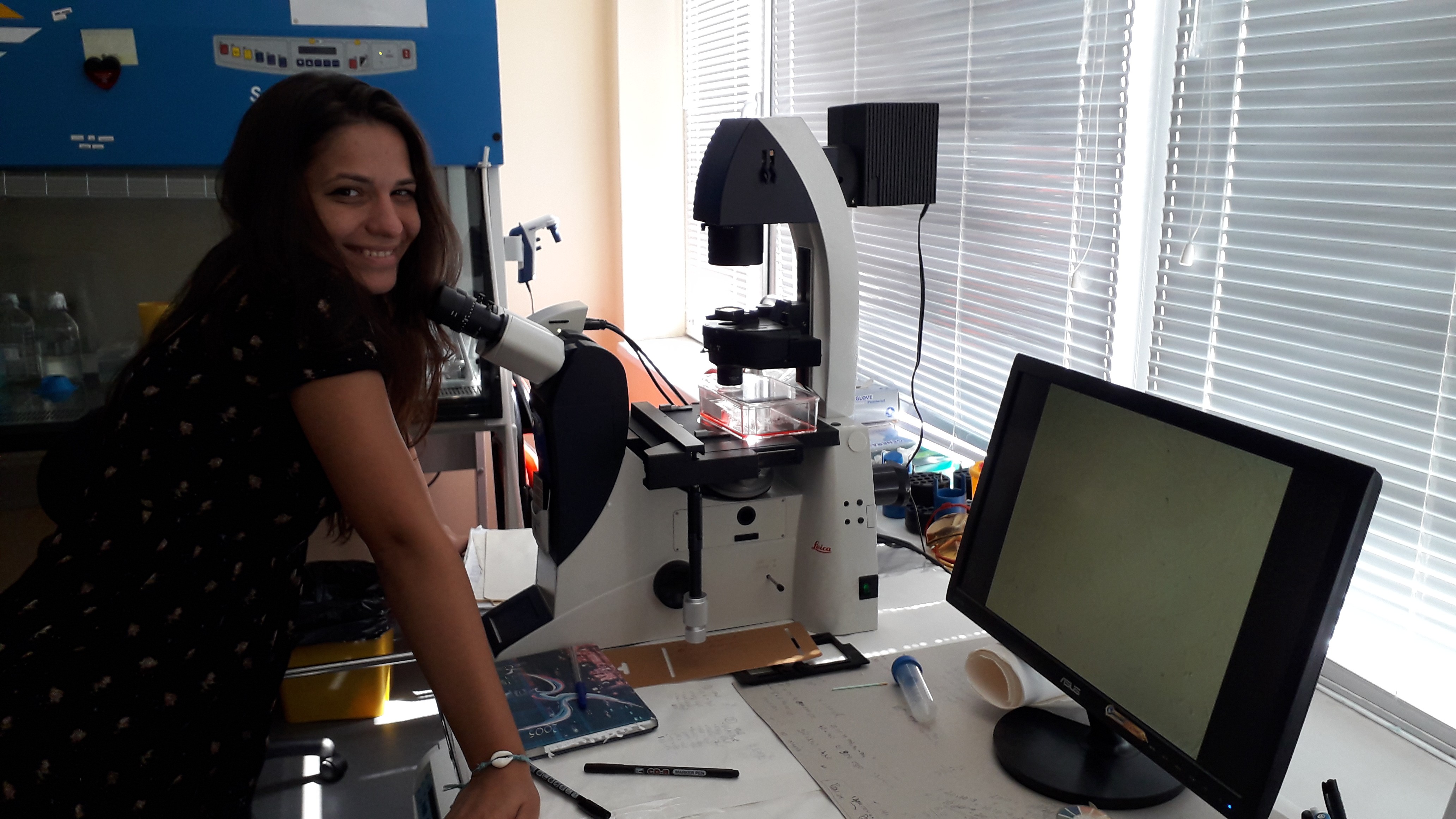
Martina Lazarova during a lab experiment, ©Martina Lazarova
The future ahead
The initial target group of the scientists are young people suffering from acute injuries caused by sports and various industrial and domestic physical activities or suffering from birth disorders of the cartilage. The product has the potential to be used in the treatment of professional traumas, common for athletes, skiers, miners, and others. It is possible that lab-grown collagen becomes the building block for heart valves and be implemented in the spheres of aesthetic medicine and reconstructive surgery (as an alternative to silicone breast implants, for example).
“Our expectations are to obtain a cell line with a proven ability to synthesize human collagen and come up with a method for its modeling in various 3D structures. A measurable result will be the creation of a collagen monolayer 3×3 cm in the next 1 year,” the team shares. Supported by their university professors, Martina and Milko are hoping to move towards clinical trials of a human collagen prototype in the next five years.
The role of recursive innovation
The solution can possibly alleviate the health care system by reducing the cost of hospital stays and shortening the recovery process after knee operations. Martina and Milko predict that shortening implant placement times and reducing the number of times side effects occur can lead to an increase in the productivity of healthcare workers. The two college students also discuss the lack of innovations that are developed by medical students in Bulgaria.
“Our system is idealizing doctors for the sacrifices they make for the job – not spending time with your family, not having a quality life due to lack of sleep and lack of free time.” Martina, who has joined our Zoom call from the hospital, where she is on duty, shares. “This is problematic because college students are taught they need to make these enormous sacrifices in order to be good doctors. At the end of their third or fourth shift, they are underpaid/pro bono human beings that risk making a mistake due to their fatigue,” she adds.
Another major problem she points out is the lack of information regarding entrepreneurship opportunities for medical projects and innovations. “I know almost everything about the business part of our project from Milko and this lack of entrepreneurial know-how is typical for most of the medical students as they are too focused on their studies, which prevents them from seeing the alternatives through which they can benefit the society,” Martina believes.
Milko, who has been part of an ABLE Activator program, has a different opinion. As a member of the Digital Health and Innovation Cluster Bulgaria (DHI), an NGO and leading ecosystem actor, supporting organizations in the field of digital health and innovative healthcare solutions, the college student is among the organizers of a non-mandatory course in digital entrepreneurship for his peers. It provides them with the EU legal framework of setting a medical office and administering it. “The course is not seeing a lot of interest from students,” he reports. To Martina, the explanation is hidden in the deeply rooted traditions and hierarchy in Bulgarian medical universities which prevent people from going outside the box.
In any case, the two scientrepreneurs believe the key to mobilizing the entrepreneurial spirit of others is through creating success stories and spreading the word about them. “Even if we fail, I hope that what we have managed to do so far inspires people to start their own entrepreneurial venture,” Martina concludes.

